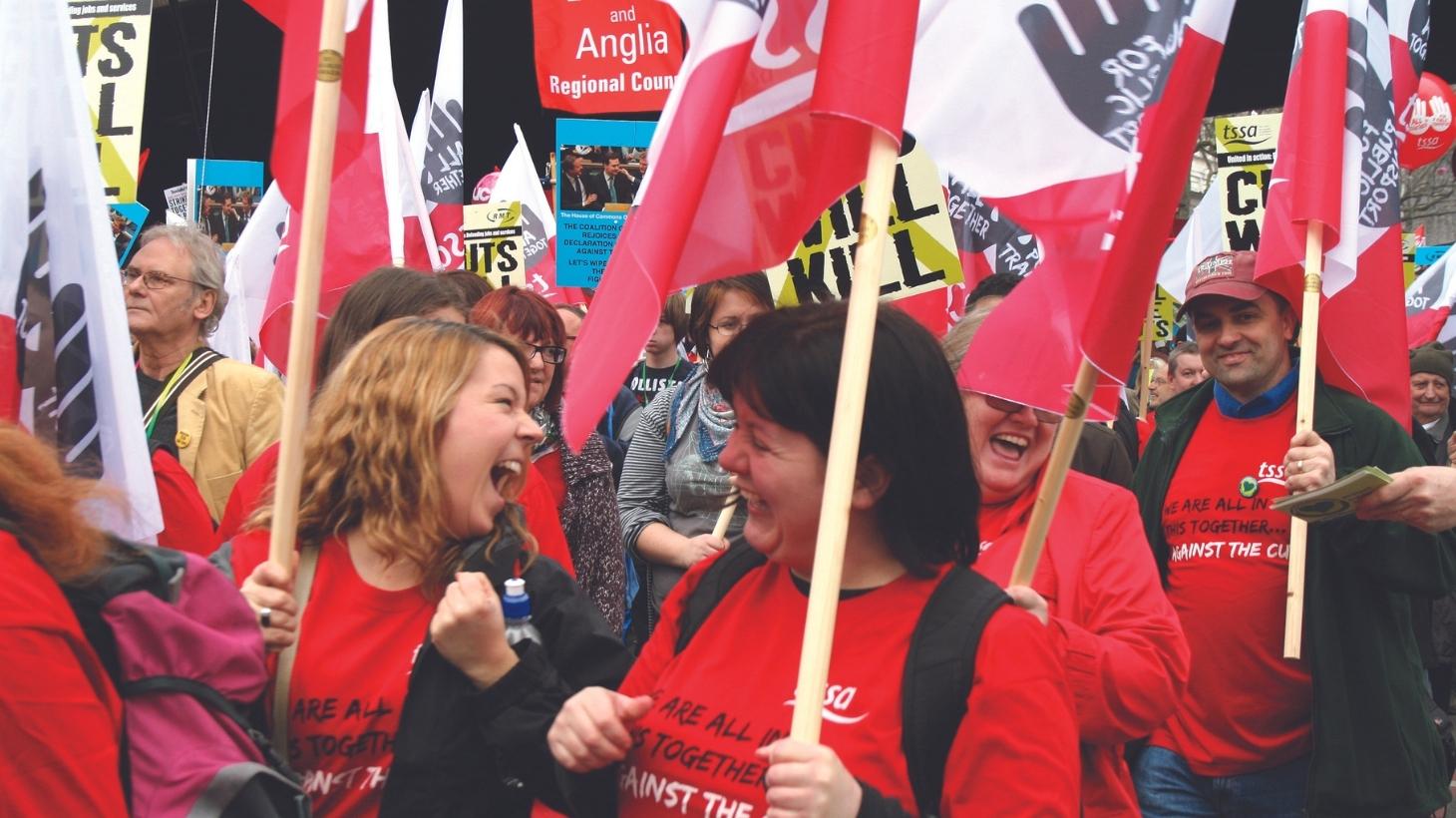TUC Congress 2023 Report

TUC Congress 2023, Liverpool;
Sunday 10th to Wednesday 13th September 2023.
The following report was written collectively by our TSSA delegates to TUC Congress.
TSSA Delegation: Peter Pendle (Joint Interim General Secretary), Fliss Premru, Simon Turp and Frank Ellis. Each of the delegates spoke to a motion and TSSA was well represented at the fringe meetings with Peter speaking at ASLEF Investment in Rail and Fliss at the #MeTU fringe meeting.
Congress began with a long debate on Public services, led by Christine McAnea of UNISON and Mark Serwotka of PCS, covering the funding of pay review bodies and restoring the value of public sector pay. This year’s President Maria Exall of CWU gave an excellent address and chaired Congress well, in the address she talked about the anti-Trades Union Laws, anti-racism and sexual harassment. The day ended on a high with a lively address from the President of the AFL-CIO Liz Schuler. Having got the Biden administration to pass “Inflation Reduction Act”, the unions need to work to make it produce good quality “union jobs”, particularly in the anti-union “free” states in the south. They will also be working in 2024 to prevent a return of Trump.
Some of the delegation attended the GFTU fringe event on Sunday evening, which was brilliant for networking with trade union colleagues.
Monday started with debates on the NHS and on education, a lot of this centred-on burnout due to excessive workloads. Paul Nowak gave the new General Secretary’s address, paying tribute to his immigrant family and life in his native Liverpool.
Our motion on sexual harassment within the movement was included in composite 12 along with the Women's Conference motion sparked a huge and moving debate. Fliss spoke on behalf of TSSA saying that as well as the expose in TSSA (Kennedy) and other Inquiries, it was a union wide problem (open secrets) with sisters bullied out of the movement. It needed pan-union inquiries into behaviour including the effectiveness of staff unions, a halt to spending members money on gagging orders, and that transformation needs involvement of survivors and women’s reps, members and groups; change does not happen with just replacing posts after perpetrators have gone with different women and men.
Delegates visited the fringe event on investment in rail by ASLEF, of which Peter Pendle was a speaker.
On the Monday afternoon Transport Industry section, Simon represented TSSA on composite 4 about the transport industry which incorporated our TSSA amendments. He spoke about greening the railway, and making sure that the infrastructure is invested in to ensure a future for rail. Also spoke about electrification of rail, and HS2.
The importance of the ticket office closures was reflected not only on Monday but in an emergency motion on Wednesday. In the shipping sector the problem of 'flags of convenience' and the abuses of the rights of seafarers were highlighted.
A major upcoming issue is the introduction of more anti-trades union laws requiring minimum service levels during strikes. The legislation is not through yet and the Tories will then have to produce statutory instruments, before we know how they intend to apply the new law. When that happens a special Congress will be called and the unions will resist the law. There may be a legal challenge as the new law violates Human Rights legislation which guarantees the right to strike.
Nowak in his address mentioned that union membership is falling, a motion outlining this concern was carried. Union density is below 50% in the public sector and only 12% in the private sector, and 200,000 members were lost last year. The first contested motion was motion 76 on the role of Trades Councils, this would have given them greater representation at Congress and three seats on the General Council. The General Council opposed this, the TSSA delegation supported the motion but after it went to a 'card vote' it was lost by 3137 to 850.
Sadly, the 11th September 1973 was the day of the fascist coup in Chile that overthrew the elected government of Salvador Allende, it was the beginning of neo-liberalism and marked the beginning of decades of oppression, Chile still has poor public services as a result. We were addressed by Eric Campos Banto General Secretary of the CUT Chile a moving end to the day.
In the evening, Angela Rayner attended a fringe event to set out Labour’s new deal for working people.
Tuesday 12 September morning session began with debates on education and a motion on establishing a Royal Commission into the Criminal Justice system. The risks to prison staff were explained very graphically.
The main speech was an address by Angela Rayner MP, the Deputy Leader of the Labour Party. She outlined their “New Deal for Workers”, she promised an Employment Rights Bill in the first hundred days of a Labour Government, and Trades Union Laws fit for the twenty first century. A clear promise was made to make blacklisting illegal, to investigate the Orgreave Picketing incident during the miner’s strike, the right of unions to access workplaces, simplified recognition laws and electronic balloting. She also promised day one rights to unfair dismissal a ban on zero hours contracts, ending the gender pay gap and a real living wage. Angela also promised to start building Council Houses. There followed an equalities debate on anti-racism, ending hostility to migrants an protecting the rights of LGBT+ workers.
In the afternoon we had a moving address from Lynn Sudbury-Riley from Covid Bereaved families and a motion outlining the effects of Covid in the workplace, the extreme affects on unprotected health workers in a broken system, the huge and prevalent cases on debilitating Long Covid and a warning from the FBU that we must prepare for future pandemics which are guaranteed. While Boris partied ordinary people’s families suffered. The day ended with a good debate on the future of the BBC and employment rights for staff who work there.
A motion of solidarity on the Ukraine was moved by GMB and seconded by ASLEF was complex – the ASLEF amendment had softened the original GMB stance, but the motion caused some consternation many delegations, with the pro lobby arguing for open-ended military aid in order to achieve the self determination of Ukraine and counter Putin, and the lobby against concerned for the affect of a prolonged war with no peace in sight which was aligned to the policy of our Tory government meant an arms proliferation. This produced the only disagreement in the delegation - TSSA like many other delegations effectively abstained – (allowing a vote for and vote against along with two abstentions). The was carried overwhelmingly despite a strong speech from the FBU. However, the abstentions, though significant, were not counted.
The final day started with a debate on pay and casualisation in the arts, Sandi Toksvig of TV fame, spoke for the Writer’s Guild, she explained very clearly the importance to writers and actors of royalty payments when material they have written is reused by streaming companies. This is the reason for actors and writers strike in the United States of America.
It was followed by a motion supporting Trades Council’s role in campaigning.
Our motion 78 on the stopping of the e-risks newsletter in June 2023, this was done due to the TUC’s inability to fund it, because Thompson’s had withdrawn sponsorship. It also may have consequences for the future of Hazards Magazine. Thompson’s say this is not quite the case and they will fund something similar. Frank moved the motion, pointing out that it was important to many Health and Safety reps and is read by thousands of members, the motion was carried, while not being opposed by the TUC General Council, the response was far from a straight forward promise to reinstate it.
RMT had moved an emergency motion on the closure of Ticket offices, Peter was able to second this and it was carried overwhelmingly showing the determination of Congress that we continue to fight together on this issue.
The main business ended with an emergency motion from GMB opposing the closure of Wilkos and the large loss of jobs, following the closure of their stores. It was moved by a Wilko worker of many years, lamented the loss of her livelihood and work family, moving many in the conference to tears.
Solidarity with all the trade union struggles – la lucha a continua!

